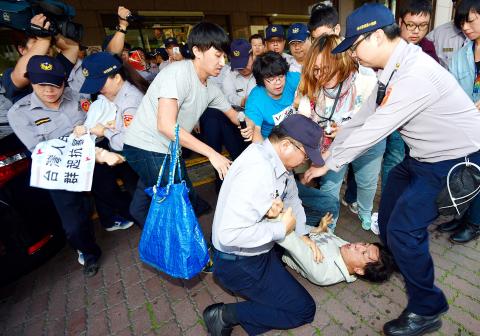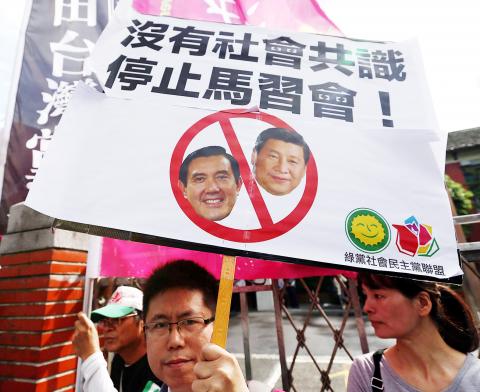The Legislative Yuan should recall or impeach President Ma Ying-jeou (馬英九) for ignoring it during negotiations to meet with Chinese President Xi Jinping (習近平), third-force party leaders said yesterday in a series of protests.
“[Ma] is seeking to meet with Xi for his own personal gain,” said New Power Party (NPP) Chairman Huang Kuo-chang (黃國昌), accusing Ma of attempting to burnish his legacy at the expense of changing the direction of national security policy, and trampling on Taiwan’s democracy and sovereignty by bypassing the Legislative Yuan.
He added that Ma’s trip would violate earlier promises, referring to a 2011 television interview in which Ma said that he would not meet with Chinese leaders if re-elected.

Photo: Lo Pei-der, Taipei Times
“Because the next election is only a couple months away, the Ma government is essentially a caretaker administration. What right does he have to make such an important decision about Taiwan’s safety and future when he has approval ratings of only 9.2 percent?” NPP legislative candidate Chiu Hsien-chih (邱顯智) asked.
While the Ma-Xi meeting constitutes “important national business” for which legislative approval is required under Article 63 of the Constitution, the Legislative Yuan only learned about Ma’s plans after they had been finalized, instead of conducting a “substantive review” of potential harm to national security, he said.
Following a press conference outside the Legislative Yuan in Taipei, about 50 NPP party activists marched to the Presidential Office Building to reiterate their demand that the meeting be canceled. They could not get close to the building because the streets around it had been cordoned off by police with barbed wire barricades earlier in the morning.

Photo: EPA
Green Party-Social Democratic Party alliance activists held their own protest, calling for Ma to be impeached for violating constitutional requirements to seek legislative approval.
They said the government lacked a mandate for conducting the meeting, while accusing the Chinese government of attempting to interfere in the Jan. 16 elections.
“Ma doesn’t have any mandate for surprising us with this meeting — ever since last year’s Sunflower movement, it has been clear that the handling of cross-strait relations by the governing party is not trusted by the people,” Social Democratic Party Chairman Fan Yun (范雲) said.
Last year’s Sunflower movement saw the legislature’s main chamber occupied as part of massive student protests against the government’s handling of a cross-strait service trade agreement.
“Ma has always hoped to meet with Xi Jinping, but Xi has never before been willing. From the fact that he has suddenly agreed to the meeting about 70 days before the elections, it is obvious that China wants to use this to interfere with Taiwan’s elections,” Green Party Taiwan co-convener Lee Ken-cheng (李根政) said, adding it was not clear whether Ma had made concessions in ongoing talks over a trade in goods agreement with China to arrange the meeting.
The Ministry of Economic Affairs has said it aims to conclude the talks by the end of the year.
Because of the political import of the meeting — as opposed to previous lower-level talks on economic issues — it should not be conducted in the absence of a strong “social consensus” and legislative approval, Lee said.
Representatives of the Free Taiwan Party (FTP) condemned the talks for diminishing national stature, stating that the “government in exile [of the Republic of China] was inviting its own destruction.”
“While Singapore has invited Xi Jinping for an official visit, it has only invited ‘Mr Ma’ to serve as a dinner guest, which clearly represents a downgrading of the national status of the Taiwanese,” Northern Taiwan Society vice president Li Chuan-hsin (李川信) said.
FTP activists attempted to break into the lobby of the Mainland Affairs Council in protest. The youth division of the Taiwan Solidarity Union also threw colored smoke bombs over the cordons surrounding the Presidential Office Building.
In a separate protest, the Economic Democracy Union said the meeting should be canceled because the Legislative Yuan has yet to pass “supervisory regulations” for cross-strait talks, condemning comments by Minister of Economic Affairs John Deng (鄧振中) that the meeting would “help” talks on a trade in goods agreement.
Union convener Lai Chung-chiang (賴中強) said the Ma-Xi meeting and trade talks were both “from one book” of the government seeking to conduct unsupervised negotiations.
Without the establishment of mechanisms for “democratic negotiations” to allow affected industries to participate in negotiations, only large corporations would benefit from any resulting agreement, he said.

SECURITY: As China is ‘reshaping’ Hong Kong’s population, Taiwan must raise the eligibility threshold for applications from Hong Kongers, Chiu Chui-cheng said When Hong Kong and Macau citizens apply for residency in Taiwan, it would be under a new category that includes a “national security observation period,” Mainland Affairs Council (MAC) Minister Chiu Chui-cheng (邱垂正) said yesterday. President William Lai (賴清德) on March 13 announced 17 strategies to counter China’s aggression toward Taiwan, including incorporating national security considerations into the review process for residency applications from Hong Kong and Macau citizens. The situation in Hong Kong is constantly changing, Chiu said to media yesterday on the sidelines of the Taipei Technology Run hosted by the Taipei Neihu Technology Park Development Association. With

CARROT AND STICK: While unrelenting in its military threats, China attracted nearly 40,000 Taiwanese to over 400 business events last year Nearly 40,000 Taiwanese last year joined industry events in China, such as conferences and trade fairs, supported by the Chinese government, a study showed yesterday, as Beijing ramps up a charm offensive toward Taipei alongside military pressure. China has long taken a carrot-and-stick approach to Taiwan, threatening it with the prospect of military action while reaching out to those it believes are amenable to Beijing’s point of view. Taiwanese security officials are wary of what they see as Beijing’s influence campaigns to sway public opinion after Taipei and Beijing gradually resumed travel links halted by the COVID-19 pandemic, but the scale of

A US Marine Corps regiment equipped with Naval Strike Missiles (NSM) is set to participate in the upcoming Balikatan 25 exercise in the Luzon Strait, marking the system’s first-ever deployment in the Philippines. US and Philippine officials have separately confirmed that the Navy Marine Expeditionary Ship Interdiction System (NMESIS) — the mobile launch platform for the Naval Strike Missile — would take part in the joint exercise. The missiles are being deployed to “a strategic first island chain chokepoint” in the waters between Taiwan proper and the Philippines, US-based Naval News reported. “The Luzon Strait and Bashi Channel represent a critical access

Pope Francis is be laid to rest on Saturday after lying in state for three days in St Peter’s Basilica, where the faithful are expected to flock to pay their respects to history’s first Latin American pontiff. The cardinals met yesterday in the Vatican’s synod hall to chart the next steps before a conclave begins to choose Francis’ successor, as condolences poured in from around the world. According to current norms, the conclave must begin between May 5 and 10. The cardinals set the funeral for Saturday at 10am in St Peter’s Square, to be celebrated by the dean of the College